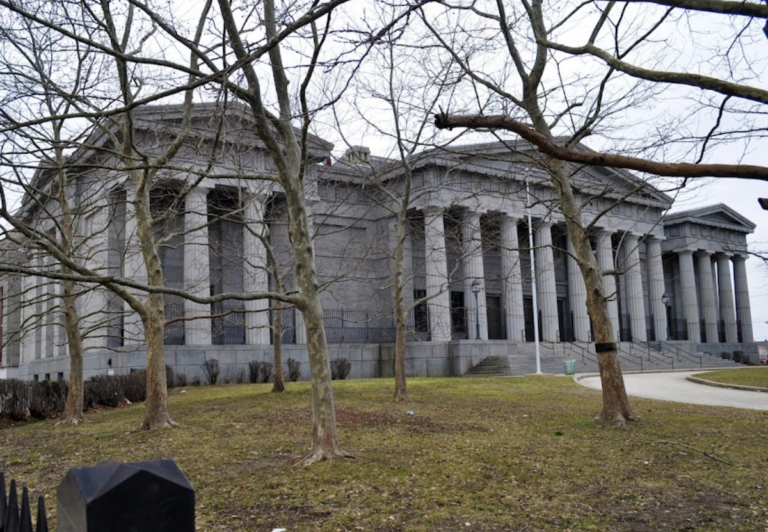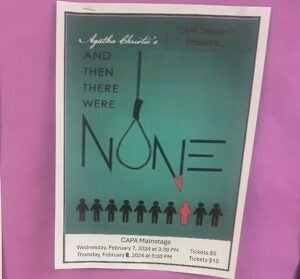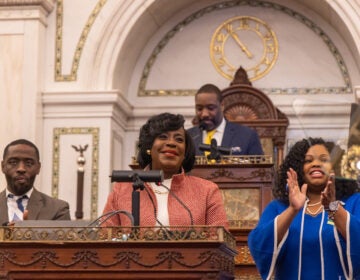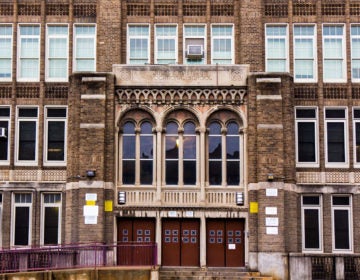A racist play was staged at Philly’s CAPA during Black History Month. The pushback is still ongoing
"And Then There Were None," an adaptation of Agatha Christie's popular mystery novel, has racist tropes and undertones.

Philadelphia High School For Creative & Performing Arts on South Broad Street. (CAPA).
Officials at The Philadelphia High School for Creative and Performing Arts (CAPA) are hosting a town hall in April to address concerns over the staging of a racist play during Black History Month.
The play, “And Then There Were None,” adapts Agatha Christie’s popular mystery novel, first published in the United Kingdom in 1939 as “Ten Little N******.”
The title, drawn from a minstrel show song and its original cover art, which featured racial caricatures, were changed for the American audience due to their offensive nature.
In a letter to school and district officials, CAPA parents and students complained about the “racist, xenophobic, and violent content” in the Feb. 6 and 7 productions.
The play, they said, lacked historical context and did not provide any cautionary preface or follow-up discussion.
“It wasn’t until after the performance that I was educated on the history and that just made everything that was included in the performance that much more problematic,” said one student.
CAPA and school district officials did not respond to several WHYY News requests for comment.
This isn’t the first time the school has faced backlash over a racist theater production.
In 2015, students shut down the staging of “Thoroughly Modern Millie” after protesting the play’s racist portrayal of Asians. In 2022, CAPA students staged a walkout protesting discrimination and racism in a school where a majority of students are people of color.
“As a parent, I was shocked and hurt by it,” said Elethia Gay, co-vice president of the CAPA Home and School Association, who lodged a complaint about this year’s production with the principal.
Shantrelle P. Lewis, a filmmaker and author who attended the event with her husband and daughter, a senior at the school, singled out a particular scene.
“There was a scene in the play where a noose swings out on stage and a white student is holding the noose,” Lewis said. “The whole crowd gasped. We were not sure if somebody was going to get lynched or what would happen next. I was kind of aghast and shocked.”
To many Americans, a noose is a symbol of the lynching or hanging of African Americans prevalent in the U.S. starting in the 1800s. An image of a noose on the flier that promoted the play was also circulated at CAPA.

Between the 1800s and 1900s, some 4,000 African Americans were lynched in the U.S., according to the Equal Justice Initiative. They were often falsely accused of sexual predation or some perceived slights against white people before being tortured and murdered. One of the most famous incidents was the murder of Emmett Till, a 14-year-old child from Chicago, who was abducted, tortured, mutilated and killed by a white mob for allegedly whistling at a white woman. That woman, Carolyn Bryant, died in 2023 at 88 years old. She recanted her accusation but never faced justice.
“We just thought all of this stuff was happening in the play, but we later found out the history of the play,” Gay said. “I am definitely going to the meetings. I do intend to show up at the meetings to let them know how important it is to have a discussion before showing this type of content.”
Several parents told WHYY News that the level of violence in the play was inappropriate without some prior warning, especially in light of recent gun violence affecting Northeast High School and Imhotep students.
“Of the last two characters, one died by suicide and one died after suffering from a gunshot wound,” Lewis said. “There were lots of children in the audience.”
Lewis said her daughter was singled out in the class by the teacher and she felt ostracized by some students.
Molefi Asante, professor of African American studies at Temple University, said he didn’t think the play should have been produced for high schoolers. “But if you do, you have to talk about the history of racism in Britain and America,” Asante said. “You have to have some discussion about why this play is significant now? The director of the play missed an opportunity to really educate the students about the meaning of the play.”
The incident at CAPA comes at a time when states like Florida and some school districts in Pennsylvania are banning books related to African American history. More than 20 states have such laws in place.
In the wake of the play’s staging, CAPA principal Jennifer Melendez penned a letter to the community, apologizing for the hurt it caused.
“As your school leader I deeply apologize for the offense that this has caused … please know that as a school community we are taking active and intentional steps to prevent similar incidents in the future. While I cannot undo the harm caused, please know that as a school community we are taking active and intentional steps to prevent similar incidents in the future,” Melendez wrote.
Melendez’s letter promised to bring the school community together for a discussion about the incident. The town hall meetings will held on Monday, April 8 and Tuesday, April 9.

Get daily updates from WHYY News!
WHYY is your source for fact-based, in-depth journalism and information. As a nonprofit organization, we rely on financial support from readers like you. Please give today.







